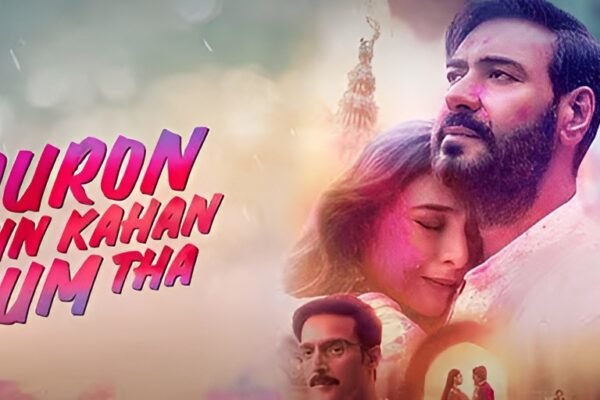
Introduction
Kalki 2898 AD has to be the biggest Indian science fiction movie ever made, a mix of mythology, futuristic dystopia, and action adventure. Nag Ashwin is helming this 2024 epic starring Prabhas, Amitabh Bachchan, Kamal Haasan, and Deepika Padukone in key roles.
Set in a post-apocalyptic world in the year 2898 AD, the film draws inspiration from Hindu mythology, particularly the prophecy of Kalki, the tenth and final avatar of Lord Vishnu, who is destined to end the age of darkness (Kali Yuga) and restore righteousness.
In this detailed review, we’ll explore:
• The plot and story breakdown
• Character performances & analysis
• Visual effects & world-building
• Themes & mythological connections
• Final verdict – Is Kalki 2898 AD worth watching?
Kalki 2898 AD – Full Plot Summary
The movie is filmed in the city of Varanasi (Kashi) of 2898 AD when the world on Earth is governed by an authoritative government led by Supreme Yaskin (Kamal Haasan). The world is divided between the ruling oppressors who live in a floating city named “The Complex” and the oppressed masses who are striving to survive in wastelands down below.

A man without a past, Bhairva (Prabhas), exists in this utopian world as an avenger. Pregnant Sumathi (Deepika Padukone) is being hunted by the army of Yaskin because her unborn child is supposed to be the awaited Kalki—the messiah to put an end to the bad reign.
A mythological invincible fighter Ashwatthama (Amitabh Bachchan), dharma upholder, comes back from centuries of exile to save Sumathi and her son. Bhairva’s life also hangs in balance as the empire pursues them, and the fight between tyranny and destiny starts.
Elegant plot summary of the film
2898 AD Dystopian Society
The film begins with the declaration of Kali Yuga’s end times, during which evil and suffering fell upon human society. Metropolis city Metropolis Kashi has reduced to a cyberpunk slum under totalitarian control by Supreme Yaskin, an oppressive deity-ruler with absolute control over super-AI, cyber-warrior robots, and a ginormous surveillance state.
Bhairva’s Ruthless Survival
Prabhas is Bhairva, a cybernetically enhanced bounty hunter funded by an empire, who turned renegade and abducted rebels and sold them as live prizes to the empire. Prabhas’s own character is split in two—neither good nor bad—until his own life is turned upside down when he becomes associated with Sumathi by accident. He then turns out to be a morally indeterminate character.
Sumathi & the Prophecy of Kalki
Deepika Padukone as Sumathi, having a kid avatar who is the prophesied Kalki. The empire is under threat as this prophecy states that they would be defeated. Ashwatthama (Amitabh Bachchan), always since Mahabharata times, is entrusted with guarding her and keeping it a secret.
The Empire’s Hunt & the Final Battle
Yaskin uses his army, such as biomechanical warriors, to kill Sumathi before Kalki is born. The climax is an epic fight where Bhairva, Ashwatthama, and rebel troops fight Yaskin’s army in a visually beautiful sequence.
The Twist & Sequel Setup
A revelation on Bhairva’s actual identity and a tease on the future role of Kalki sets up a possible sequel at the end of the film.
Performance Analysis – Standout Roles
Prabhas as Bhairva
Prabhas delivers gruff and intense with raw physicality and emotion sensitivity. His evolution from egotistical mercenary into one of the prophecy’s best heroes is intriguing.

Amitabh Bachchan as Ashwatthama
Bachchan’s evolution as the enigmatic immortal warrior is haunting and humbling. He looks every inch his mighty self on screen, especially in action scenes where he employs antique weapons against modern foes.
Deepika Padukone as Sumathi
Deepika brings weight to Bachchan’s mother character who will stop at nothing to save her son from the harsh world. The rapport between Bachchan and hers gives weight to the story.
Kamal Haasan as Supreme Yaskin
Haasan plays the god-king antagonist, suave and wicked. His metaphysical observations on power and fate make him the most interesting character.
Visual Effects & World-Building
Kalki 2898 AD boasts some of the best VFX in an Indian film on par with Hollywood sci-fi blockbusters. Highlights:
Floating City (The Complex) – Hierarchical, vertical metropolis cityscape of a future metropolis.
Cybernetic Soldiers & Biomech Designs – The empire army are spine-tingling biomechanical warriors.
Post-Apocalyptic Kashi – Varanasi desolation injected with recent technology creates surreal visual beauty.
The efforts of Djordje Stojiljkovic (*PS-1*) take it one step further in describing the big picture.
Themes & Mythological References
1. Kalki Avatar & Hindu Prophecy
The movie takes advantage of the Kalki Purana prophecy in which the final avatar of Vishnu predestines the end of the Kali Yuga. The child’s birth symbolizes hope amidst an evil world.

2. Immortality of Ashwatthama
Ashwatthama, as per Mahabharata, was cursed to live an existence that shall never find its completion. The movie takes up this myth to its fullest potential and makes him a tragic guardian of mankind.
3. Dystopian Power & Revolution
Tyranny vs. freedom motifs and AI manipulation and man’s fight against them are emphasized, which sat well with the paranoia of modern times against technology and tyranny.
Final Verdict – Should You Watch Kalki 2898 AD?
✅ Reasons to Watch:
• Innovative Indian sci-fi on Hollywood production level.
• Strong performance by Prabhas, Bachchan, and Kamal Haasan.
• Favorably balanced mix of future and myth.
• WOW action & world-building.
❌ Possible Drawbacks:
• Some pacing issues in the second half.
• Too much explaining for newbies of Hindu mythology.
Rating: ⭐⭐⭐⭐½ (4.5/5) – Sci-fi and epic story fans can’t do without it.
Conclusion
Kalki 2898 AD is an Indian science fiction epic film that mixes ancient mythology and dystopian futurology. With heart-stopping performances, heart-stopping visuals, and an unmatchable story, it raises the bar for high-end storytelling.
A must-watch if you’re a fan of sci-fi, mythology, and action on an epic scale!
Watch Kalki 2898 AD online? Write to your comments!



